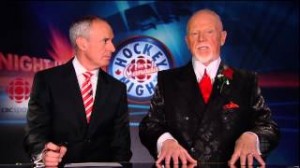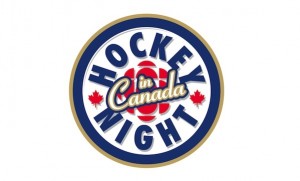The first year of Hockey Night in Canada after it was taken over by Rogers was nothing short of a disaster, and don’t let the spin from Rogers’ media boss Scott Moore fool you.
In a recent article on the CBC, Moore defended his program, doubled-down on virtually all the problems and was, frankly, insulting in his portrayal of the people criticizing the show.
Now, no one expects him to come out and agree with all the things people are saying, but by promising more of the same and writing off the criticism as being from “dozens of people on Twitter,” he came across as an old-media protectionist with no concept of the world as it is in 2015.
The Problems With HNIC
The problems with the show are typical of any workplace that was performing fine but then gets a new boss or management team: they ignored what was already wrong (a lack of diversity, a regressive way of looking at the game, an over-reliance on ex-players and a potentially stale format) and instead focused on superficial change merely for the sake of change.
Out goes Ron MacLean in favor of George Stroumboulopoulos, seemingly to appeal to younger audiences and appear more hip. Like virtually all attempts to appeal to young people by 50-something corporate executives, this backfired horribly.
Stroumboulopoulos is a great TV personality and interviewer, but he is not the right fit for a hockey broadcast, and worse, he has the impossible task of replacing MacLean who is a beloved Canadian institution and someone who was masterful at his job. Sure, Stroumboulopoulos is OK, but (for no reason) the new execs came in and changed the one thing that was working perfectly, seemingly to put their own stamp on the program.
The second problem with the new HNIC is Don Cherry. As my colleague Callum Fraser recently pointed out: “In 2015, Cherry and MacLean, on average, are given just shy of six minutes for Coach’s Corner. That’s a lot less than just a year ago when they were given anywhere from eight to eleven minutes with CBC.”
This is another example of tampering with something that was working. Love or hate Cherry, he offers one of the most unique and interesting takes on the NHL out there. In a world where so much is homogeneous, safe and boring, Cherry stands out because he is interesting – which is more than can be said for the rest of the show.
Furthermore, the show relegates woman to doing token interviews in the halls and does not feature them on the panels, even though the bar for intelligent, interesting or thought provoking discussion is incredibly low.
The show features almost no discussion of coaching, game strategy or advanced statistics. Instead we are treated to weekly shouting matches about heart, leadership and plus/minus. There seems to be a rule about challenging the audience: the show would rather placate it than teach it anything.
HNIC features too many middle aged white guys, no young people, barely any woman and far too many talking heads whose appearance on TV is a mystery to anyone (Damien Cox and Glen Healy are especially terrible). Certainly anyone exclusively tuning into HNIC would not learn about any of the new ways of thinking about the game that most hardcore hockey enthusiasts are now taking for granted, such as the decline of the defensive-defenseman; the uselessness of plus/minus; the problems of confirmation bias; that the ‘bottom six’ isn’t just for checking roles; the importance of possession etc.
Hockey Night in Canada should strive to be the best hockey show in the world and it is currently falling well short of that standard.
Rogers’ Response
First off, before I get into the official response, I don’t think that Rogers should cave to every criticism. I don’t think that they should be striving to create a populist program, but I do think they should take the criticisms seriously and explore whether or not they can do better, which based on their response, I do not feel they are doing.
Instead of taking the summer to reflect on the first year and the criticisms levied, Moore, the President of Sportsnet and NHL Properties for Rogers, in an interview with CBC on Tuesday said that there will be “tweaks,” but his answers do not inspire confidence and instead are actually dismissive and somewhat insulting.
In dismissing the criticism of his show by saying that it comes from only “dozens of people on Twitter,” Moore shows a vast misunderstanding of the current media landscape. While I acknowledge that people with negative views are far more likely to voice them, and that some people will hate change and others will automatically dismiss anything they don’t want to hear, you can’t just write off Twitter as a non-entity because, while there are caveats, it is also the main voice of people who care enough to want HNIC to be better.
I mean, a vast majority of their audience is going to watch Saturday Night hockey no matter what, so they should be listening to the people who actually know what they are talking about. I am an impartial observer with an audience in the tens of thousands, and I watch hundreds of hockey broadcasts – from all over the league – every year, and you could say this about hundreds of hockey bloggers who are not doing what they do for the money, but for love of the game. It would only improve the product – which, without getting too cheesy and sentimental about it, is a central tenet of our culture – if they listened to the people who know what they’re talking about.
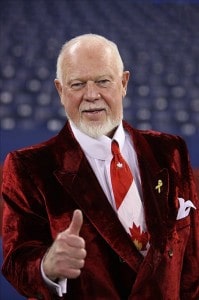
Furthermore, while I understand the head of a mainstream media conglomerate being somewhat protectionist of his domain vs. the emerging and ever-growing world of blogging and ‘new media,’ I again point out that these are the people who care, and the people who can write what they think without being censored. Anything TSN says is going to look like sour grapes and Rogers either owns almost everything else or features their people on its broadcasts, so if you aren’t listening to the fans, the people on Twitter or bloggers, who are you listening to?
If you look at Moore’s CBC interview, it doesn’t appear that he is listening to anyone, but rather seeing what he wants to see and spinning everything into a best-case-scenario.
For Example:
1. Ratings not as good as anticipated?
“Was it up as much as we would like? No, but I think the boys in blue down the street might have had something to do with that,” said Moore.
The Leafs sell out every single game and they’ve been brutal for a decade. As excuses go, this is thin. Yes, a competitive Leafs team would help. So would a quality broadcast, but Moore doubles down on the outside influences:
2. External Factors
Moore said he expects more interest next season with the arrival of new Leafs coach Mike Babcock, and budding young star Connor McDavid joining the league.
Yes, that is probably true, but they are external factors. It seems to me that the emergence of interesting scenarios and conveniently competitive large-market teams is always going to be in flux. Rogers, therefore, needs to be able to weather this with a quality broadcast. Trust me, people won’t flock to watch a last-place team with a marquee coach for very long and McDavid won’t stay new forever.
Literally everything everybody does is better when the circumstances are in their favor, but if you truly want to succeed, you have to be the best when circumstances are not as favorable as they could be.
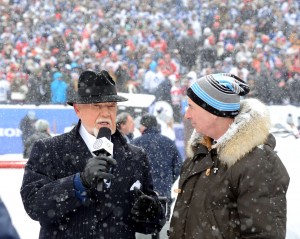
3. The Host
“We expect people to grow even more used to him next year.”
Talk about faint praise.
You shouldn’t have to “get used” to someone. This is condescending. Why not just admit you made a mistake and bring back the legendary guy that people love?
MacLean is a Canadian hero and a public institution. He is to Stroumboulopoulos what the Beatles are to Justin Beiber. The Wayne Gretzky to Stroumbo’s Korbinian Holzer.
I mean no disrespect to Stroumboulopoulos, I like him, but no one can replace MacLean and it’s not a matter of “getting used to it,” it’s more about the fact that few people in the world are as good at their jobs as MacLean is at his.
4. Ratings
Moore dismisses the ratings because they don’t include multiple platforms. This, like his dismissal of Twitter, has all the authority of an Old Navy commercial co-opting urban slang to sell cheap jeans to soccer moms: it’s not only weak, but insulting. Nobody watches a hockey game on a tablet, laptop or phone unless they absolutely have to, and, like it or not, Twitter is a fairly accurate barometer of public opinion.
Thankfully Moore stops short of asking the kids to get off his lawn.
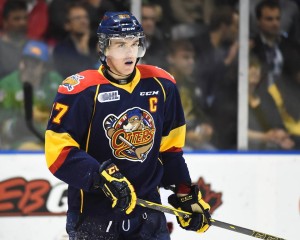
5. On Air Personalities
“We have a really good indication now of what works for us on Saturday in primary playoffs and that’s Elliotte Friedman, Kelly Hrudey and Nick Kypreos,” Moore told the CBC.
To be blunt: You do not have any indication of what is working.
The panels are boring, regressive and conservative.
Friedmen is good, but would be better serving up inside information rather than debating with people. The rest of the panel shames what should be the best hockey broadcast in the world. My advice would be to stop relying so much on ex-players. Yes, they offer a necessary perspective, but they also are not trained critical thinkers. One or two is enough.
Instead, they should be looking for critical thinkers, who are comfortable on TV and who know hockey and have charismatic personalities. The lack of charismatic people on the broadcast is one of, if not the biggest problems.
There should be some women, someone who knows stats, and above all, a mission to challenge the audience as well as entertain them.
We live in a time when the game of hockey is becoming vastly more interesting and progressive, and there is a great opportunity for someone to embrace this and move beyond the conventional four white middle-aged guys yelling at each other about heart, plus/minus and leadership.
The show should be far more progressive – teaching its viewers about things the most hardcore of hockey fans are already taking for granted, such as possession stats, graphs, and the ways these things are changing the game. Instead of appealing to the casual fan, HNIC should realize that if they appeal to the actual hockey enthusiast, the rest of the world will follow.
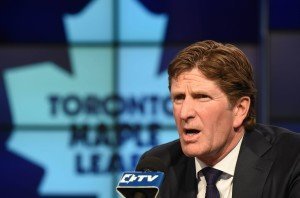
Conclusion
Instead of promising to fix the problems, or even look into them, it seems that Rogers has already made up it’s mind: Not only will Stroumboulopoulos be back, but they seem set on maintaining the same boring status quo that has drawn criticism that is virtually universal.
“We’ll be looking to tweak over the next little while,” said Moore, who rates the first year “a strong 7.5 out of 10.” That is horribly and bizarrely optimistic. As someone who is far more than a casual hockey fan and who has grown up watching HNIC, I give it a 2 out of 10 and consider it a generous rating.
